
Transcription
James A. Gondles Jr.
Executive Director
American Correctional Association
206 N. Washington Street
Suite 200
Alexandria, VA 22314
Dear Mr. Gondles:
I write to seek information about the American Correctional Association's (ACA's) procedures
for inspecting an accrediting facilities during the ongoing coronavirus disease 2019 (COVID-
19) pandemic, and what steps the ACA has taken to ensure facilities are adequately managing the
public health crisis.
The ACA is the primary accreditor for federal state, and local private prisons and detention
facilities.^1 According to the AcA, the purpose of accreditation is "to improve facility operations
through adherence to clear standards relevant to all areas/operations of the facility, including
safety, security, order, inmate care, programs, justice, and administration."^2 According to the
ACA, a primary benefit of accreditation is "safeguarding the life, health, and safety of the public,
staff, and offenders."^3 The ACA's Performance Based Manual includes seven parts, two of
which are "Safety" and "Care." Unfortunately, ensuring proper standards of health, safety, and
care during the COVID-19 pandemic requires following much different protocols than before the
pandemic hit.
As COVID-19 continues to wreak havoc in communities across the nation--with prisons and
jails being the largest hotspots in the country--it is more important than ever that correctional
facilities are taking every possible step to prevent and manage the spread of COVID-19 in order
to protect the incarcerated individuals in their custody, as well as correctional staff, their
families, and the general public.
Since the early stages of the pandemic, public health experts have warned that incarcerated
individuals "are at special risk of infection, given their living situations," and may not be able to
take the precautionary steps to protect themselves that non-incarcerated people can, such as
_________________________________
^1 The American Correctional Association, "The History of the American Correctional Association," June 7, 2020,
http://www.aca.org/ACA_Prod_IMIS/ACA_Member/About_Us/Our_History/ACA_Member/AboutUs/AboutUs_H
ome.aspx?hkey=0c9cb058-e3d5-4bb0-ba7c-be29f9b34380.
^2 The American Correctional Association, "The History of Standards & Accreditation," July 7, 2020, http://www.aca.org/ACA Prod IMIS/ACA Member/Standards Accreditation/About Us/ACA Member Standards and Accreditation/SAC About Us.aspx?hkey=bdf577fe-be9e-4c22-aa60-dc30dfa3adcb.
^3 The American Correctional Association, "Manual of Accreditation Policy and Procedure," Page 9, March 15. 2017, http://www.aca.org/ACA Prod IMIS/docs/standards%20and%20accreditation/ALM-1-3 IS 17-Final.pdf
social distancing measures and increased sanitation practices. In addition to their unique vulnerability to contracting and spreading the virus, there are unique challenges to providing adequate medical care for incarcerated individuals who become infected, meaning that management of this pandemic will be harder and less effective for incarcerated people, their families and staff in these institutions. **5
Unfortunately, these warnings have been borne out, as prisons and jails across the country have become hotspots for the rapid spread of the virus. In fact, prisons and jails are amongst the hardest hit communities in the country, with 12 of the 15 largest COVID-19 "clusters" in the U.S. being correctional facilities including all five of the largest clusters. ^6
The Federal Bureau of Prisons (BOP) has also mismanaged the crisis and made matters worse. Last month, the Marshall Project published a report on the BOP's handling of the COVID-19 outbreak and found that "BOP was unprepared for the pandemic and slow to respond, and that top officials even took measures that contributed to the spread of the virus."^7 As the primary accreditor for prisons, jails, and detention facilities in the U.S., this makes it all the more important that the ACA conduct rigorous oversight of facilities' responses to the pandemic.
To that end, I request that the ACA provide my office with a detailed description of the steps the ACA is taking to ensure that the facilities that it accredits are taking every possible step to prevent and manage the spread of COVID-19, as well as ensuring that facilities provide adequate care to incarcerated individuals in their custody infected with the virus. Please include information on any performance-based measures that have been added or adapted specific to the prevention and management of COVID-19 and how the ACA is continuing to audit and accredit facilities while ensuring the health and safety of detainees, facility staff, and ACA staff.
Because this is a time sensitive matter, I ask that you provide your response no later than July 15, 2020. Thank you for your attention to this matter.
Sincerely,
Elizabeth
Elizabeth Warren
United States Senator
_________________________________________
^4 Achieving A Fair and Effective COVID-19 Response: An Open Letter to Vice-President Mike Pence, and Other Federal, State and Local Leaders from Public Health and Legal Experts in the United States." March 2, 2020, https://law.yale.edu/sites/default/files/area/center/ghip/documents final covid 19 letter from public health and legal experts.pdf.
5 The Hill, "4 Ways to Protect Our Jails and Prisons From Coronavirus," Dr. Homer Venters, February 29, 2020. https://thehill.com/opinion/criminal-justice/485236-4-ways-to-protect-our-jails-and-prisons-from-coronavirus,
6 The New York Times, "Coronavirus in the U.S.: Latest Map and Case Count." Sarah Almukhtar et. al., July 7, 2020. https://www.nytimes.com/interactive/2020/us/coronavirus-us-cases.html#clusters.
7 The Marshall Project, "I Begged Them To Let Me Die": How Federal Prisons Became Coronavirus Death Traps," Keri Blakinger and Keegan Hamilton, June 18, 2020. https://www.ihemarshallproject.org/2020/06/18/i-begged them-to-let-me-die-how-federal-prisons-became-coronavirus-death-traps.
ACA
FOUNDED 1870
American Correctional Association
206 N. Washington Street, Suite 200
Alexandria, Virginia 22314
703-224-0000. Fax: 703-224-0010
www.aca.org
July 29, 2020
The Honorable Elizabeth Warren
309 Hart Senate Office Building
United States Senate
Washington, DC 20510
Dear Senator Warren,
This is in response to your letter dated 8 July, 2020 regarding ACA's standards and accreditation practices.
Because of the COVID-19 pandemic, ACA has greatly reduced its auditing of correctional facilities. I know you can appreciate that, because of the spread of the coronavirus, such visits put incarcerated residents and staff, as well as the auditors, at risk. The fact that many states now impose 14-day quarantine restrictions on travelers into the state and upon residents returning to their home states has made it impractical, in fact virtually impossible, to accomplish most accreditation audits.
Our Performance-Based Standards Committee generally meets during our Winter Conference in January and our Congress of Correction in August. Unfortunately, because of COVID-19, ACA had to cancel our 150th anniversary Congress of Correction scheduled for this August in Cincinnati. Therefore, the Performance-Based Standards Committee will not meet, and no new standards will be taken up.
Despite the adverse impact of the pandemic on our accreditation audit efforts, ACA has undertaken to educate correctional officials on this unique circumstance. On March 10, 2020, ACA hosted a complimentary webinar, entitled "Coronavirus COVID-19: Corrections Webinar," for 1250 participants.
ACA hosted another webinar on March 23, 2020, entitled “Coronavirus COVID-19: Corrections Update Webinar," with 1920 persons in attendance, again at no fee. On March 30, 2020, ACA hosted another complimentary webinar, entitled “Coronavirus COVID-19: Managing the Stress of Uncertainty by Taking Care of You," for 1364 participants. On August 4, 2020, ACA will host a subscription webinar ($10.00 fee) entitled "Implementing Alternatives to Restrictive Housing and Ensuring Public Health: Maintaining Safety and Security During COVID-19". All webinars hosted to date were recorded and can be found on the ACA Coronavirus Resources page at our web address.
I do not have figures on the number of deaths of incarcerated persons due to COVID-19, but, as a result of the virus, over 110 correctional staff have given their lives in service to our country by working in corrections.
A majority of our mandatory standards address medical treatment or healthcare. Our association is a leader in ensuring that the healthcare services in accredited correctional facilities meet or exceed that which is generally available to the public. Correctional staff throughout our country are working 24 hours a day to ensure that they and incarcerated persons are at the least possible risk due to this virus.
Sincerely,
James. A. Gondles, Jr., CAE
Executive Director
8/3/2020
On prison reform, Gov. Reeves needs to lead, follow, or get out of the way | Opinion djournal.com
https://www.djournal.com/opinion/on-prison-reform-gov-reeves-needs-to-lead-follow-or-get-out-of-the way/article_8b9bb27f-42e4-5597-8a6c-9fa3d0270193.html
On prison reform, Gov. Reeves needs to lead, follow, or get out of the way
Jul 30, 2020
[image of woman]
Anyone who has driven on 1-55 has seen the bumper sticker that reads: "Lead, Follow or Get Out of the Way." When it comes to Mississippi's prisons, the same could be said of Governor Reeves.
It is no secret that the Mississippi Department of Corrections is in crisis. MDOC is being investigated by the Justice Department for civil rights violations. Multiple lawsuits have been filed because of the horrible conditions of the state's prisons. And now, COVID-19 has reached the cell blocks. If allowed to fester, these problems will cost the state millions in litigation and trigger an expensive federal takeover of the prison system.
Modest prison reform legislation was approved by the legislature in June to address overcrowding, safety and sanitation issues. Despite overwhelming, bipartisan approval, Governor Reeves vetoed Senate Bill 2123. In explaining this drastic action, the Governor cited objections from a handful of very vocal sheriffs, who have a vested interest in the status quo. But the status quo is unsustainable.
With Mississippi having the second highest imprisonment rate in America, SB 2123 is desperately needed. It would have allowed the Governor's Parole Board to consider more candidates for parole. Of course, those who remain a threat to the public would be rejected. But by expanding the pool of people who could apply for parole, the state could reduce its prison population and costs. MDOC would have more funds to fix the prisons and avoid litigation. And it would encourage good behavior by inmates hoping one day to qualify for parole, thereby making prisons safer.
In rejecting SB 2123, the Governor relied on inaccurate information from the bill's opponents. For example, in his Facebook post explaining the veto, the Governor claimed that the legislation went "too far" because "a criminal can get parole if they're convicted of crimes that could get them the death penalty but they get sentenced to life imprisonment instead."
In Mississippi, people convicted of capital crimes face one of three sentences: death, life in prison without parole, or life but with the possibility of parole. SB 2123 would not have allowed anyone actually facing a death sentence or life without parole to be released. However, those who were sentenced to life with the possibility of parole might have a chance - however unlikely - to leave prison one day. |
The Governor also stated that "[r]ight now, you're eligible to get out of prison at 60 unless you're a trafficker, habitual offender, or violent criminal," and that SB 2123 "totally eliminates those protections." Under SB 2123, however, habitual offenders and people convicted of drug trafficking would be excluded from parole eligibility. For elderly inmates - who are much more expensive to imprison because of their healthcare costs - the bill would have permitted "geriatric parole." But it would be limited to those who are at least 65 and have served at least ten years behind bars - a group that rarely reoffends due to age.
While the legislation would have granted more offenders a shot at parole, it provided no guarantees. The Governor's own Parole Board would have to review the entire file, including the offender's record, his likelihood to re-offend, and the views of the victim. Only then could the Board even consider granting parole. These measures would have provided strong assurances that dangerous people would remain in prison.
The approach taken by SB 2123 is not new. Other states have put in place more flexible parole standards as a way to offer a pathway to redemption and deal with prison overcrowding. Utah, for example, has broader parole eligibility than Mississippi, and yet has a lower crime rate.
It seems the Governor vetoed this much needed bill based on bad information. But the bottom-line result is the same: MDOC has few options to address problems that long predate Governor Reeves' election. Left unchecked, Mississippi will face costly lawsuits and potentially an even more expensive result: a federal takeover. But it's not too late. If the Governor really wants to fix the prison system, he should call a special session of the legislature and put forward a proposal that preserves the spirit of SB 2123 while addressing his concerns. Otherwise, the legislature has every reason to override Governor Reeves' veto.
DAVID SAFAVIAN is the general counsel of the American Conservative Union Foundation. AUTUMN BILLINGS IS ACU Foundation's Assistant General Counsel.
Other posts by this author
|
2023 may 31

|
2023 mar 20

|
2022 aug 23

|
2022 aug 23

|
2022 aug 23

|
2022 aug 23

|
More... |
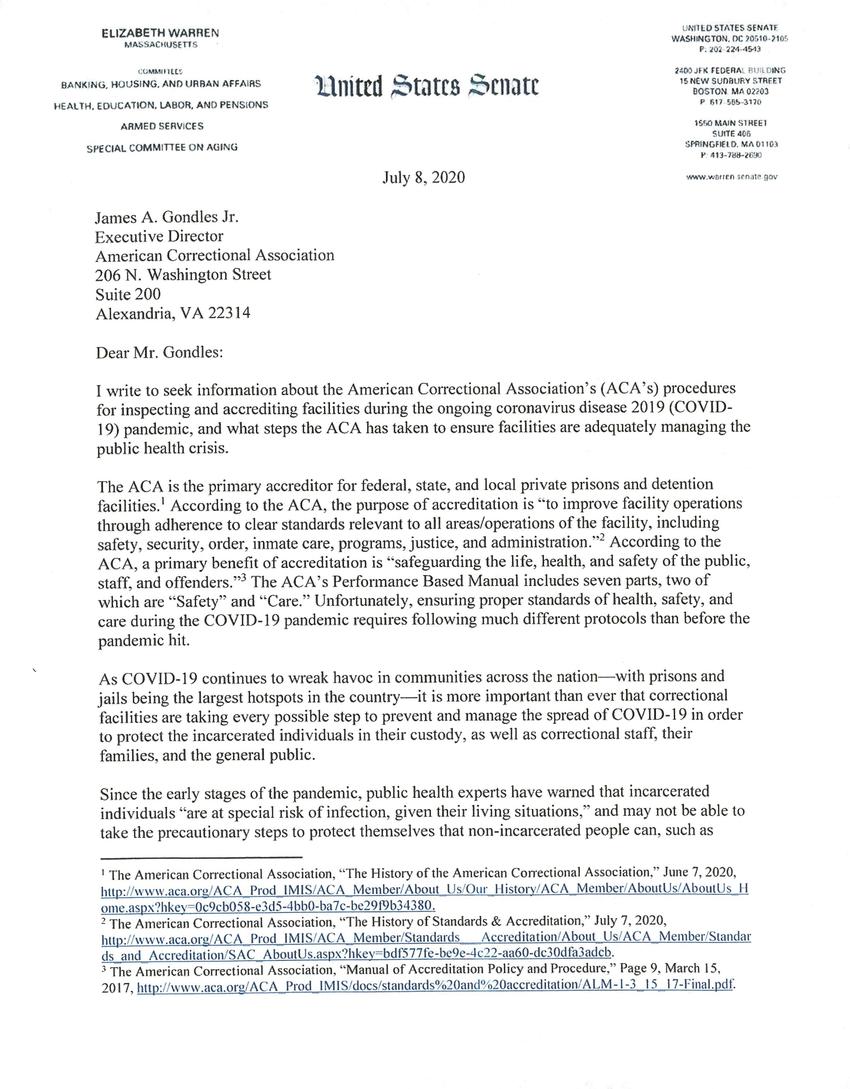
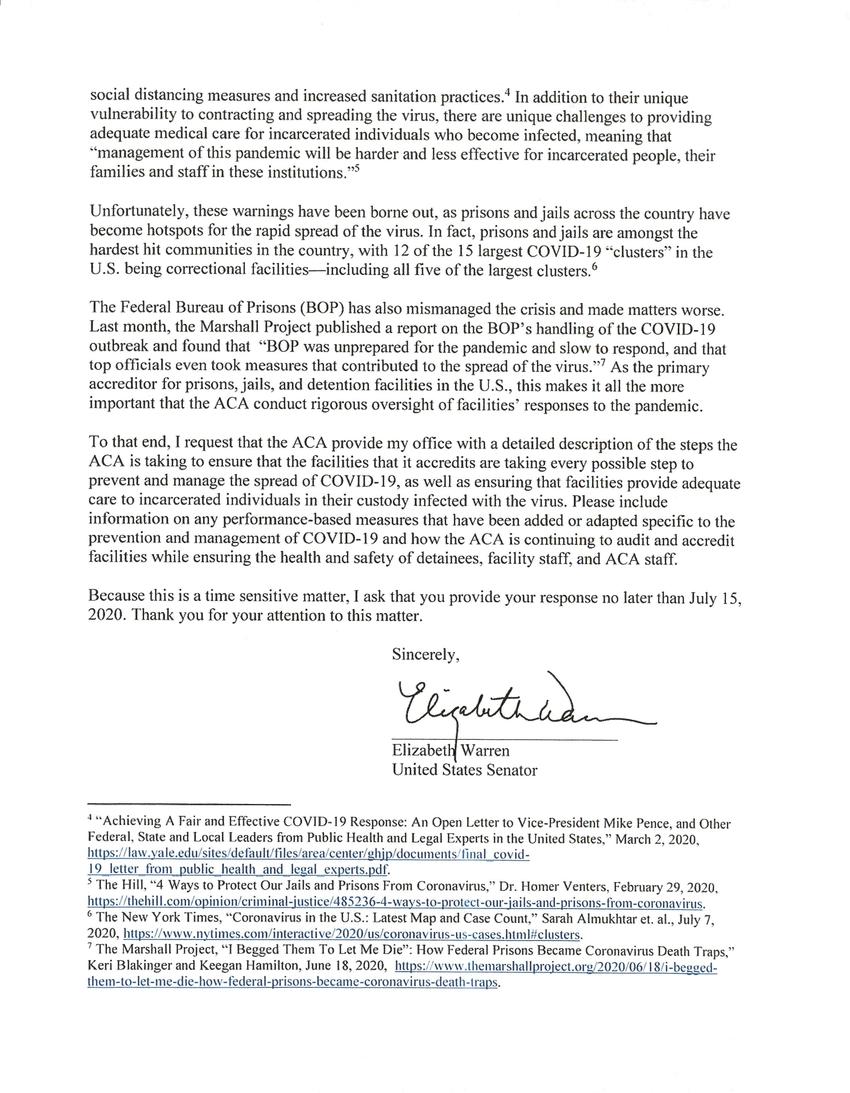
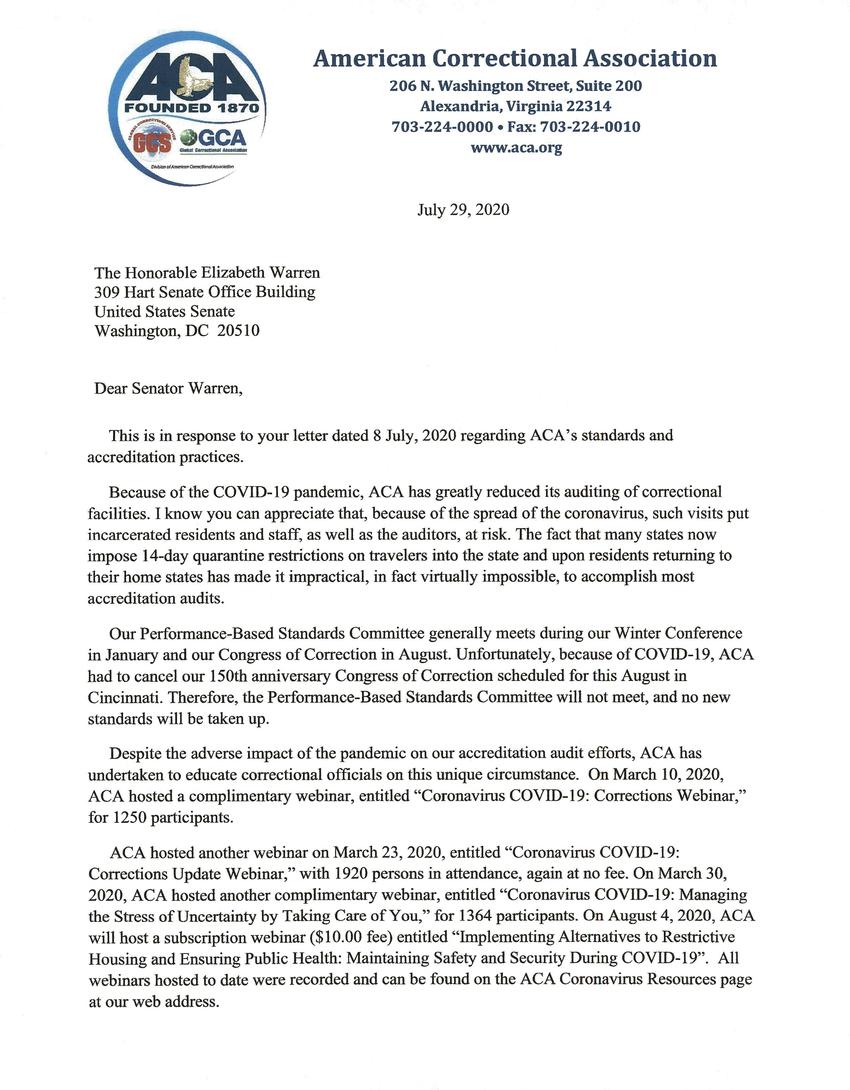
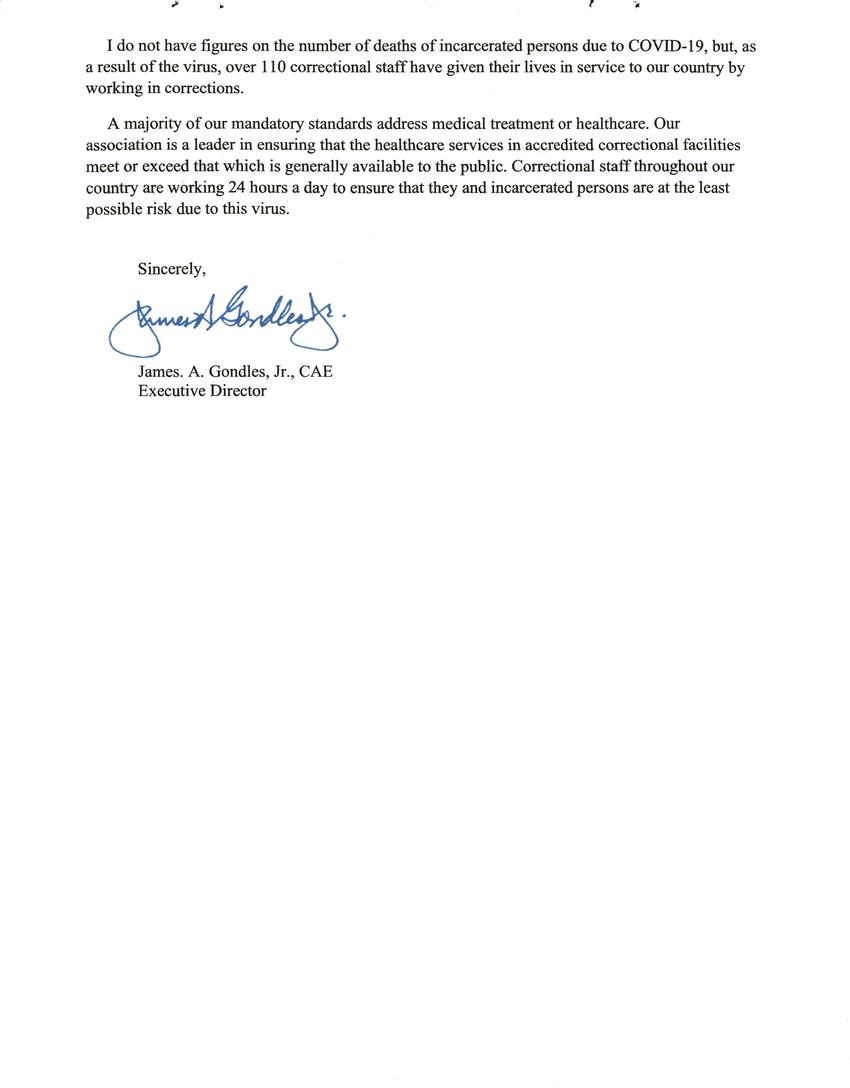
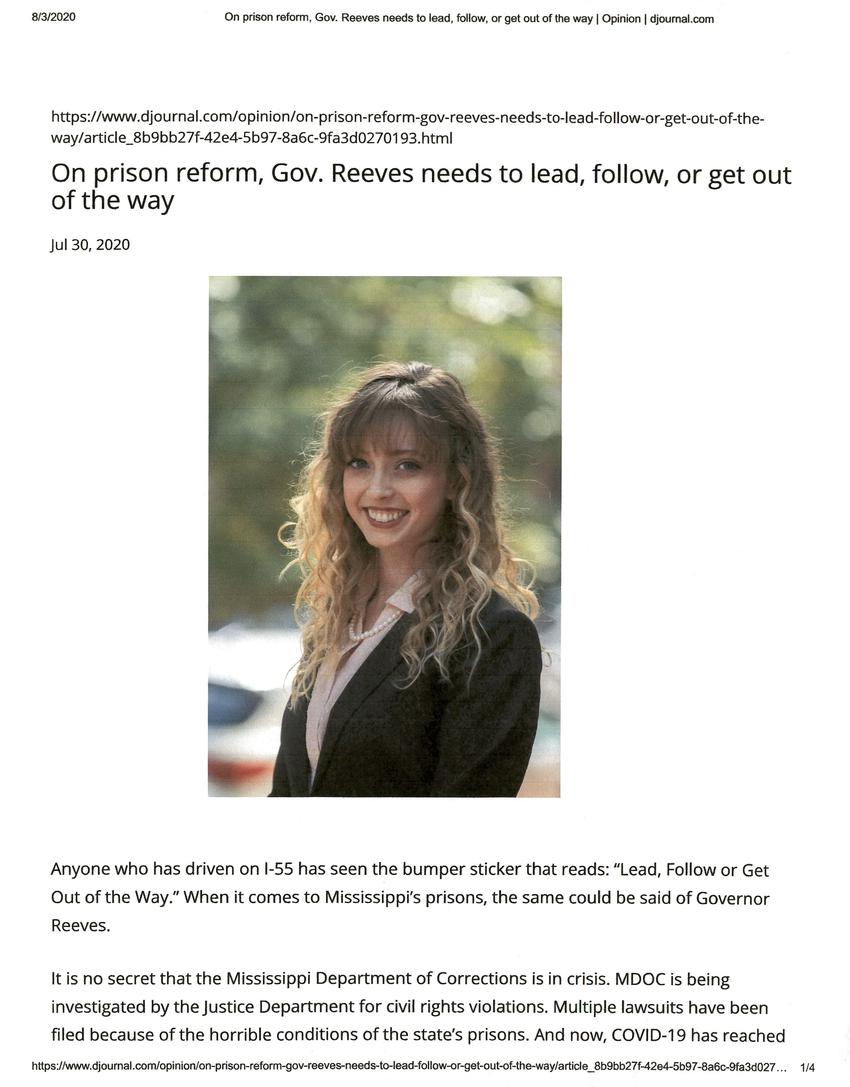
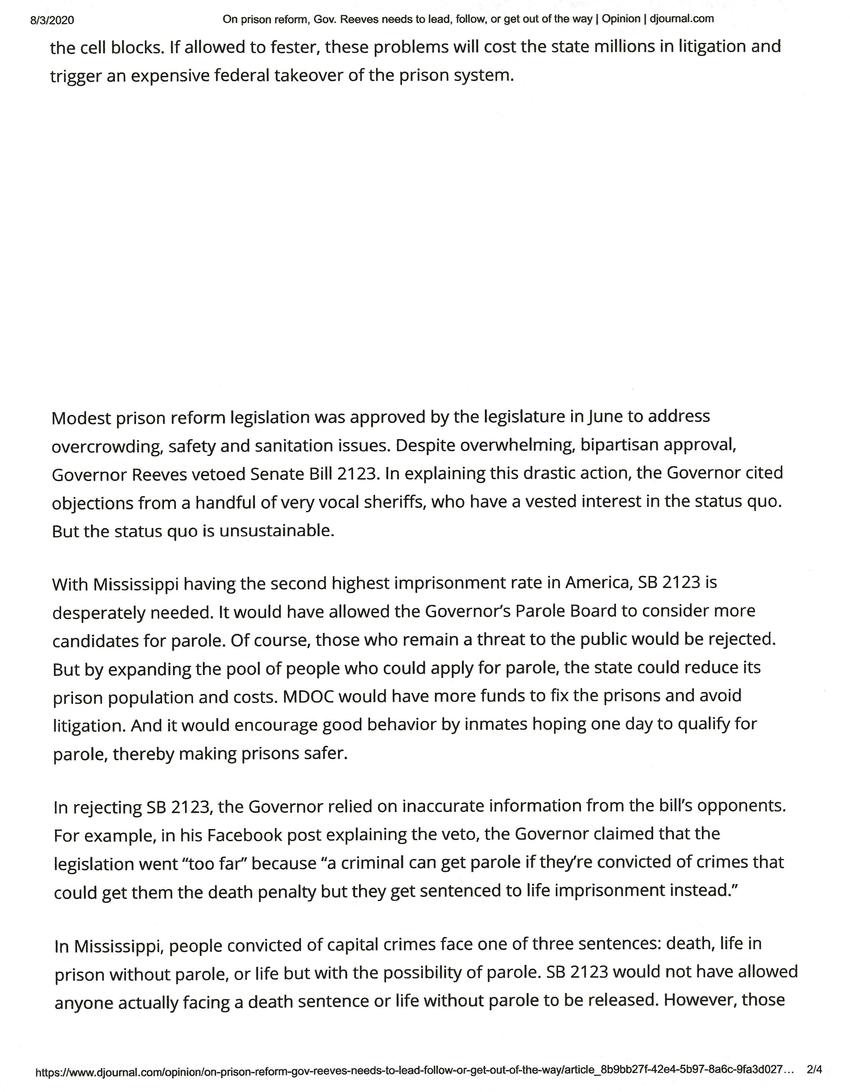

Replies (2)